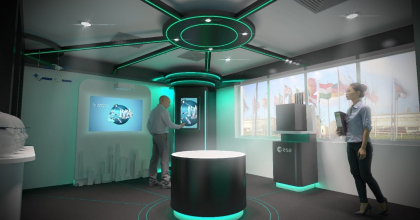Developed by Astrium GmbH, the Medusa feed system is a multiple-feed-per-beam design and is located in the focal plane of a parabolic reflector antenna. Only two such antennas are required to produce full Ka-band multiple spot beam coverage, one to transmit and one to receive. In contrast, conventional antenna farms for multiple spot beam missions require three or four reflectors, each with an associated feed array.
This reduced number of antennas enables the antenna farm to be implemented on a large platform alongside other missions. It also makes it possible for manufacturers of small platforms to enter the multiple spot beam market. The antenna concept additionally has potential for exploitation at other frequencies and for other applications.
“As a technical expert, it is always exciting to see innovative ideas turning into products and reaching the technical maturity required to eventually be embarked on a satellite. ESA and its industrial partners have been very active on the topic of multiple beam antennas and some promising concepts are still being investigated to further reduce antenna farm complexity. In this field of research, the Medusa feed system is a major milestone” said Dr. Nelson Fonseca, from the Antenna and Sub-Millimetre-Wave Section.
Building upon the success of a German national technology development programme, the Medusa feed system was subsequently further developed, manufactured and qualified as part of an ARTES 3-4 project. It provides a good illustration of how European satcom companies, such as Astrium, are successfully working with ESA’s Telecoms and Integrated Applications Directorate to develop commercially attractive solutions which generate new business.
Dr. Michael Harverson, head of ESA’s Payload Technologies and Products Section explained, “It is great to see new products, developed through the ARTES programme, becoming commercially successful. The ARTES 3-4 programme is there to support this kind of innovation and is helping European industry win contracts to supply ground breaking payload technology to satellite operators like RSCC”.




